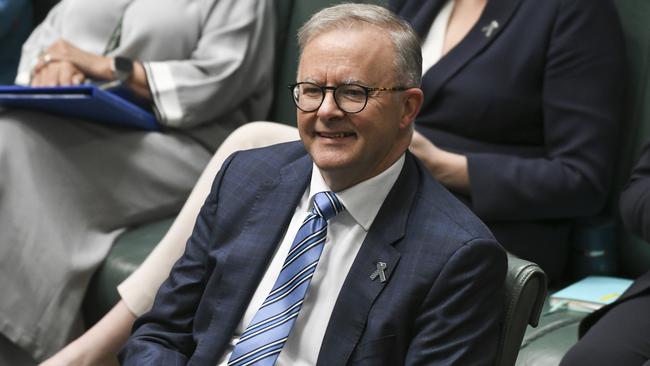Labor’s price caps likely to come back and bite
Anthony Albanese’s energy deal is an out-and-out shocker, one that will do more harm than good in several ways.

With the Labor government’s first budget forecasting skyrocketing energy prices but offering no solution to go with the bad news in October (it’s hard to know who to blame for that beyond new Treasurer Jim Chalmers), Anthony Albanese now has successfully negotiated a deal with premiers to at least do something.
Climate Change and Energy Minister Chris Bowen promised to get any deal in place before Christmas and worked diligently to cobble together a package that won the support of the Greens and enough of the crossbench to pass it into law.
Labor had made an election commitment to reduce power bills by $275 and now the independent Department of Treasury has come to the party too, somehow forecasting that the energy policy mix should reduce power bills by about $230. It isn’t the figure pledged by Labor at the election, nor is reducing the size of slated increases a real reduction, but it will have to do.
Herding premiers can be like herding cats, but with a state election just around the corner in NSW the Prime Minister was prepared to throw money at the problem to win the NSW Liberal government over.
The rest was comparatively easy: Labor tribalism was always going to win over the remaining mainland states so early in the life cycle of a new federal Labor government. After all, the final Newspoll for this year has Albanese streets ahead of Peter Dutton as preferred prime minister, and the Labor government is 10 points up on the Coalition.
But good short-term politics isn’t always the same as good politicking into the medium to longer term. Across that sort of time frame the links between good politics and good policy tend to become sharper, and the energy deal struck is anything but good policy. In fact, it is an out-and-out shocker, one that will do more harm than good in several ways.
For a start, it will deter investment and exploration, and not just in the mining sector. This government wants greater investment in renewables to help it achieve its emissions-reduction target for 2030. However, by embracing price caps on coal and gas on this occasion – with the purpose of providing cost-of-living relief for consumers – what might happen when weather events put a dent in storage and delivery capacity on the renewable front in the years ahead? Such circumstances would quite obviously result in price rises.
Anybody considering investing in renewables in this country now needs to consider the downside risk that their return on investment could be diminished by this government imposing price caps. That risk will slow such investments. According to Bowen’s own projections, we need 20,000 new solar panels built every day for the next eight years, and 40 new wind turbines built each month across the same time frame, to achieve the mooted emissions-reduction target of 43 per cent. That already sounded implausible, frankly, but what chance does it have of happening when investors flee for the hills?
There is even a risk the price caps won’t do their intended job. They apply only to producers, not energy retailers. And who is charged with ensuring retailers do the right thing and don’t sharply increase prices anyway? The Australian Competition & Consumer Commission, which doesn’t have a good track record for anything much at all beyond simply reviewing mergers (note its failures regarding supermarket prices).
Yet price caps aren’t the worst part of the energy policy design thrust on the parliament this week. At least they are limited to the next 12 months, even if the market is now aware that the government is happy to use them whenever it thinks it’s necessary to do so. The so-called reasonable price on gas – that is, the rate of return regulations – in the new rules are set to be applied indefinitely. This will severely curtail the gas market. Remember, gas is an important adjunct energy source and a vital transition energy supplement as we attempt to shift to more renewables.
Several of the design flaws in what has passed into law are a direct consequence of compromises to force an outcome so quickly: deals with premiers, the Greens, you name it. And remember that the claimed outcomes in the legislation, by the government’s own admission, won’t take effect until the second quarter of next year.
In other words, there was little policy imperative in passing the legislation this week. It could have waited pragmatically until parliament returned next February, giving everyone more time to digest what was proposed. But that wouldn’t have satisfied the political need to spruik a fix before Christmas, as had been promised.
While politics is often described as the art of the possible (initially by Otto von Bismark), too much compromise can jeopardise good policy outcomes. Former British prime minister Tony Blair was the ultimate consensus-style leader, yet even he said: “I don’t believe in sloppy compromise.” This energy package is sloppy in the extreme, but perhaps that was intended to make a national gas (and even coal) reserve look thoughtful by comparison. Albanese has flagged such thinking as what might come next.
As University of NSW economics professor Richard Holden recently wrote, the least bad option the government needs to consider is a domestic gas reservation policy in exchange for more supply. But even this solution doesn’t sufficiently lean in on the economic and environmental challenges surrounding coal.
Holden also has pointed out the problems attached to signalling to companies that they may not benefit when prices are high, courtesy of price caps for example: “They won’t invest in future projects, why would they?”
This is the law of unintended consequences too many economically illiterate politicians fall prey to – failing to realise their policy actions can have flow-on effects they didn’t anticipate or understand or that they simply underestimated.
We saw it when the live sheep trade was suddenly banned by the Gillard government and when the former Coalition government introduced robodebt to clean up the welfare system. This supposed energy fix could result in more problems than it solves, a policy amalgam that shifts decision-making, such that other policy goals can’t be met. And the political problems that the reactive legislation and regulations are designed to address just may leave legacy political failings that rebound on the government closer to the next election.
Peter van Onselen is professor of politics and public policy at the University of Western Australia and Griffith University.







Accepting that good politics doesn’t always equate to good policy, let’s start by congratulating the federal government on the political outcome achieved this week on the energy front.